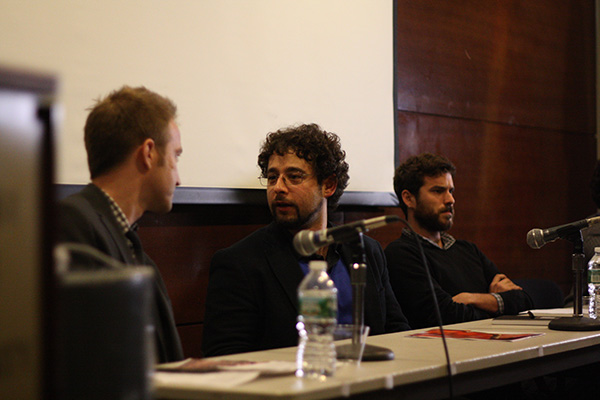
The King Juan Carlos I of Spain Center at NYU showed a series of films and held a panel discussion titled Spain in Crisis: The Spanish Crash and the Indignados Movement, which focused on the Spanish financial crisis of 2011 and the new social movements that have emerged as a result.
Similar to the Occupy Wall Street movement that started later that year, Los Indignados, which translates to “the indignant” in English, occupied public spaces in Madrid and Barcelona starting May 15, 2011, before spreading to other cities throughout Spain. The movement is also known as 15M, a reference to the date the movement started. The occupations protested high youth unemployment and what they viewed as the government’s mismanagement of the construction bubble.
The event started on Oct. 18 with a screening of the documentary “The Great Spanish Crisis.” On Oct. 19, NYU Spanish and Portuguese languages and literatures professor Bryan Cameron moderated a panel discussion featuring Princeton University professor Germán Labrador Méndez, University of Pennsylvania professor Luis Moreno-Caballud, and Spanish and Portuguese languages and literatures doctoral student Pablo La Parra Pérez.
Stern senior Nathan Wong said the documentary was helpful in comparing different perspectives of the occupation protests.
“I think the documentary was good at explaining the specific mechanics of what caused the market failure,” Wong said. “It’s nice to see at least one interpretation of how the pieces fit together.”
The event was organized in conjunction with Pragda, a company that distributes Spanish films in the United States. Jo Labanyi, director of the King Juan Carlos Center, said she wanted to do something special in her final year at the center.
“It was important that we include both serious journalistic perspectives alongside more artistic responses from some of the most provocative filmmakers working in Spain as well as the 15M movement itself,” Labanyi said.

Méndez said there needs to be a change of perspective from the common politics resulting from the corruption of previous years, when El País reported that Mariano Rajoy, Spain’s prime minister, received “black” money from the former treasurer of the People’s Party, Luis Bárcenas, from what were said to be secret party accounts.
“We need to consider that traditional politics are not working from the perspective of common people,” Méndez said. “There is a very important crisis of representation that is bigger than the social movement, so you need to separate those two things.”
Labanyi said she would also like to show that the economic crisis triggered many grassroots movements for change in Spain.
“The economic crisis in Spain has given Spain a bad press,” she said. “We felt it was important to show that it has triggered some very positive and innovative grassroots responses in the country, particularly on the part of young people who do not feel represented by the major political parties.”
A version of this story appeared in the Monday, Oct. 21 print edition. Tommy Collison is a contributing writer. Email him at [email protected].
























































































































































